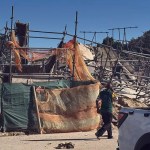Meg Fargher’s Opinionista article, “What to do when our insurance umbrella turns out to be a frame with no cover” in Daily Maverick of 22 June highlights the predicament of everyone in the tourism industry. Her article is written from the heart, the prose is exquisite, and it sincerely reflects the pain and desperation that all who have been affected by the Covid-19 outbreak and lockdown measures introduced by our government are experiencing.
These are unprecedented times – not, as Fargher correctly points out because of the outbreak of a pandemic (there have been regular outbreaks over the centuries ranging from Spanish Flu, to cholera, to the plague, smallpox, and so on), but because of the co-ordinated international response to the current Covid-19 outbreak. Never before has there been such a unanimous response from governments and leaders across all nations – international travel has been banned; local travel – banned; communal gatherings – banned; physical social interaction – banned.
With the result that those industries that service social interaction, in all of its many forms, have come to a grinding halt. There is no income to pay overheads or staff or suppliers, and unless the businesses have sufficient cash reserves to enable them to weather the storm (most do not), they will close without some form of assistance.
Inevitably, the focus then turns to what to do about this financial predicament, and more specifically who to turn to for help. Outside of the national government and the various measures it has introduced (which regrettably do not provide much relief for the tourism industry), the next port of call is the insurance industry.
Most business owners have taken out insurance cover for their businesses, and have paid (possibly grudgingly, but paid nonetheless) the annual or monthly premiums without fail, knowing that they are buying peace of mind. Their reasoning in the current situation is logical – my insurance policy includes cover for business interruption; my business has been interrupted; therefore I am covered and my insurance company must pay.
These are desperate times – the South African economy, which was not healthy before the outbreak, has been pounded mercilessly, businesses are collapsing, and job losses across all industries are reaching heights last seen decades ago. So, how should the insurance industry respond?
In simple terms, insurance is about identifying and managing risks by providing cover so that a person who suffers from one of those risks is, as far as possible, restored to the position s/he was in before the incident. Where a business such as a hotel buys cover, the risks are usually fire, storm, lightning, flooding, etc. In addition, insurers recognise that if a building is damaged by a fire, the loss that is suffered extends beyond simply rebuilding the hotel, and that for the time the builders are on site, that business cannot earn any income.
What is not covered by BI insurance, or the extensions, is a national lockdown. The sleight of semantics Fargher complains of around the use of words such as “quarantine” and “lockdown” is not, as she believes, some tactical manoeuvre by lawyers acting on behalf of greedy insurers – it is the very heart of the predicament.
Business interruption cover was introduced to cater for exactly this situation. It began in the marine world when ship owners started buying insurance to recover lost profits on freight shipments or chartering activities, and then spread to fire and property insurance. Initially, a flat rate was provided, eg, 10% of the value of the stock to cover loss of profits, but it was only in the 1940s that the model we know today was introduced in the United Kingdom. Business Interruption (BI) or Contingent Business Interruption (CBI) cover is not a stand-alone cover, it is specifically designed to cover loss of income after a disaster and is inextricably linked to the underlying damage to the property. In a nutshell, property insurance covers the actual damage to the building, BI insurance covers the subsequent loss of income.
How does this then link to a pandemic or outbreak of a disease? There is no physical damage to any property, so strictly speaking there should be no BI cover for such events. However, insurers have over the years recognised that isolated incidents, such as a disease may have wider implications than simply the medical treatment and costs of that disease.
Extensions to the standard BI cover have been included over time, such as the one provided in Fargher’s policy to include miscellaneous events such as a contagious disease within a specified radius from the insured property; or a vermin infestation at the property, etc. These are localised incidents that may affect the business, and insurers have recognised that the chances of such an event occurring are limited, and that losses will be linked to the closure of the premises for a few days, or possibly even weeks, while the clean-up operations are underway. Either no premium or a very small amount is charged for these extensions – because the probabilities are low.
What is not covered by BI insurance, or the extensions, is a national lockdown. The sleight of semantics Fargher complains of around the use of words such as “quarantine” and “lockdown” is not, as she believes, some tactical manoeuvre by lawyers acting on behalf of greedy insurers – it is the very heart of the predicament.
The two fundamental questions all insurers ask when assessing any claim are, what is the cause of the loss, and is this loss covered by the policy? Once the lockdown was implemented, the cause of the losses to the entire tourism industry was the fact that no one was allowed to travel anywhere. The outbreak of Covid-19 cases in any region or area became irrelevant because no one was allowed to stay in a hotel or visit a restaurant.
The argument that our government introduced the lockdown because of Covid-19, and therefore this is still the cause of the losses, is not correct. Our government took the measures it believed were appropriate to protect its citizens, but this was a choice of the relevant ministers in charge. A full lockdown was not the only measure available under the circumstances. Some countries, such as Sweden, did not introduce a lockdown at all, others took a far more liberal approach by curtailing some activities but allowing others. South Africa introduced one of the strictest and harshest lockdowns in the world, with a full curfew on most of its citizens. Was this the most appropriate response? The jury is still out on this one, but irrespective, what is very clear is that the consequences have been drastic.
Must the insurance industry now take responsibility to bail out the economy? This seems to be the expectation of many, certainly in the tourism industry.
Depending on the type of policy, an average of between 50% to 80% of all premiums that policyholders pay are set aside to cover the risks insured. For example, insurers know that there will be several car accidents in any given day all around the country, and they set reserves aside to pay for the losses caused by those accidents. The same with fires – they know that there will not be as many fires as car accidents, but when there is a fire the damage is likely to be far greater and the loss far higher. However, a national lockdown is not covered in any property insurance policy, and insurers have not set aside reserves for such losses.
And yes, there is even an umbrella for pandemic cover, but this has tended to be highly specialised, and until Covid-19, did not have broad appeal. Having so many choices is empowering, but it also requires careful planning – if the umbrella only covers household contents, the insurer will not entertain a claim for motor damage.
The lockdown has caused irreparable harm to many industries and businesses, but quite simply, insurers cannot pay for losses that have not been insured. If they are compelled to and have to take reserves from other lines of business to do so, there is a very real danger that if there are major losses in those areas, the insurers will not have the reserves to pay the legitimate claims.
This is not a matter of ethics, spurious arguments, semantics, the fragile fabric of our nation, or even creating jobs, as Fargher rails – it is simply about whether the policyholder has bought cover for the event that s/he is claiming for. If so, the insurer will recognise a valid claim and pay – if not, the insurer will probably reject the claim, even if the circumstances are desperate.
To use the umbrella analogy – there is no one umbrella for all insurance cover. These days insurance can be tailored to suit anyone’s needs, so we find many different umbrellas – for household property and contents; for motor; for business; for life – which may include disability cover or may only provide life cover. If the business has a solar energy system, cover can be bought for this as well.
And yes, there is even an umbrella for pandemic cover, but this has tended to be highly specialised, and until Covid-19, did not have broad appeal. Having so many choices is empowering, but it also requires careful planning – if the umbrella only covers household contents, the insurer will not entertain a claim for motor damage.
Is this then the end of the matter, and the insurers simply walk away, job done? No. Most of the insurers I know of have donated significant amounts to the Solidarity Fund. Many have their own charity drives where often in conjunction with their staff they support several charities that need far more assistance than normal. Possibly contrary to popular belief, the board members and shareholders of the insurers are looking around them, and are seeing a desperate situation in which they are a cog, and in which their own futures are inextricably linked to the fragile economy they serve. DM
















 Become an Insider
Become an Insider